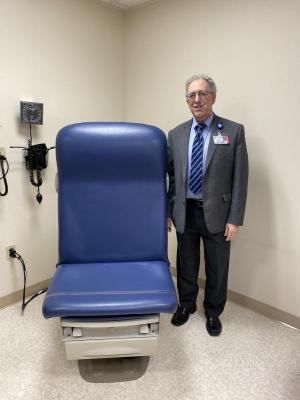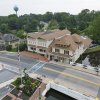Memory care screenings offer info for seniors
In my Sept. 13, 2019 column, “Community support is vital for Alzheimer’s walk,” I referenced the Swank Center for Memory Care and Geriatric Consultation at ChristianaCare. I want to learn as much as possible about memory loss, and I was invited to tour the facility in Wilmington last week.
“The study of geriatrics has been a positive experience for me,” said Dr. James M. Ellison, a geriatric psychiatrist. “Dementia is a devastating health problem we need to address. Approximately 19,000 people across Delaware are coping with Alzheimer’s disease or a related disorder.”
The Swank Center is Delaware’s first and only comprehensive outpatient office for patients with memory disorders and their families. Dr. Ellison explained, “Our approach is interdisciplinary. The geriatric neurologist, a geriatric psychiatrist, a social worker, a physician’s assistant, and a nurse practitioner all consult together. We offer families support, education and guidance from diagnosis through treatment.”
In 2019, the center treated over 3,000 patients across the state. Lower Delaware is particularly in need of increased screening, because it is estimated that 25 percent of Sussex County’s population is 65 or older.
Screening events are brought to the community by the Swank team twice a year. Forty-six people received screenings last year during events held Oct. 10 at Rehoboth Beach Country Club. Screenings will be held from 2 to 4 p.m., Friday, Feb. 28, at the CHEER Coastal Leisure Center in Ocean View.
Dr. Ellison said, “You may wish to be screened if you notice an increase in memory difficulties, trouble learning new information or remembering things previously learned, have trouble completing tasks, have new problems with language expression or comprehension, or if you notice changes in judgment or personality.”
Your own primary care doctor can rule out medical problems which can mask for dementia such as an infection in the thyroid and severe depression. Ultimately, an MRI of the brain serves as a topographical map to reveal the state and progress of the disease.
The terms Alzheimer’s and dementia are often used interchangeably, but they are not the same. AARP says, “Alzheimer’s disease is the most common form of dementia (accounting for an estimated 60 to 80 percent of cases), but there are several other types. The second most common form, vascular dementia, has a very different cause – namely, high blood pressure.”
Dr. Ellison believes that exercise can help decrease your risk of getting dementia. “I have heard people talk about doing crossword puzzles. But exercise is more important. If you have extra time in your day, go for a walk. Then work the puzzle.”
A Mediterranean diet is also recommended. Dr. Ellison said, “A Mediterranean diet is low in saturated fats and encourages consumption of healthier protein sources along with plenty of fresh fruit, vegetables, and fiber. This lowers total caloric intake, improves glucose metabolism, and also helps reduce systemic inflammation.”
Professional help allows families a better quality of life. I learned that those affected by cognitive issues cannot see contrast of colors. Using a colored toilet seat and sensor night lights which come on as you enter a room are a tremendous aid to patients.
At the close of our interview, Dr. Ellison smiled and said, “Maya Angelou says it best: ‘I've learned that people will forget what you said, people will forget what you did, but people will never forget how you made them feel.’” He and his team are dedicated to helping seniors who struggle with memory loss. For more information, contact the Swank Center at 302-320-2620.





















































